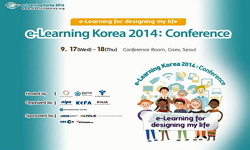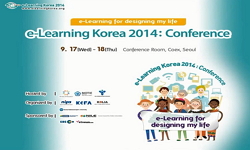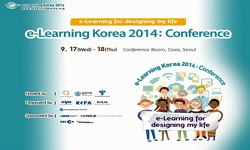Electronic learning(or e-learning) has created hype for companies, universities, and other educational institutions. It has led to the phenomenal growth in the use of web-based learning and experimentation with multimedia, video conferencing, and inte...
http://chineseinput.net/에서 pinyin(병음)방식으로 중국어를 변환할 수 있습니다.
변환된 중국어를 복사하여 사용하시면 됩니다.
- 中文 을 입력하시려면 zhongwen을 입력하시고 space를누르시면됩니다.
- 北京 을 입력하시려면 beijing을 입력하시고 space를 누르시면 됩니다.

규칙유도기법을 이용한 이러닝 시스템의 재이용의도 영향요인 분석 및 예측에 관한 연구 = A study on the Analysis and Forecast of Effect Factors in e-Learning Reuse Intention Using Rule Induction Techniques
한글로보기https://www.riss.kr/link?id=A82352547
- 저자
- 발행기관
- 학술지명
- 권호사항
-
발행연도
2010
-
작성언어
Korean
- 주제어
-
KDC
005.705
-
등재정보
KCI등재
-
자료형태
학술저널
- 발행기관 URL
-
수록면
71-90(20쪽)
-
KCI 피인용횟수
0
- 제공처
- 소장기관
-
0
상세조회 -
0
다운로드
부가정보
다국어 초록 (Multilingual Abstract)
A web survey was conducted for the full members of the e-learning education institute A in Seoul, Republic of Korea, an exclusive e-learning company that provides real time video lectures via the desktop conferencing system. The web survey was conducted for 20 days from November 5, 2009, through the e-learning web site of the company A. In this study, three data mining techniques were used:the multivariate discriminant analysis, CART, and C5.0 algorithm. This study was conducted to provide the e-learning service providers, e-learning operators, and contents developers with marketing and management strategies for improving the e-learning service companies, based on the data mining analysis results.
Electronic learning(or e-learning) has created hype for companies, universities, and other educational institutions. It has led to the phenomenal growth in the use of web-based learning and experimentation with multimedia, video conferencing, and internet-based technologies. Many researchers are interested in the factors that affect to the performance of e-learning or e-learning services. In this sense, this study is aimed at proposing e-learning system reuse prediction models in which e-learner intention to reuse influence factors(i.e., system accessibility, system stability, information clarity, information validity, self-regulated efficacy, computer self-efficacy, perceived usefulness, perceived ease of use, flow, and parental expectation) affect e-learner intention to reuse positively.
A web survey was conducted for the full members of the e-learning education institute A in Seoul, Republic of Korea, an exclusive e-learning company that provides real time video lectures via the desktop conferencing system. The web survey was conducted for 20 days from November 5, 2009, through the e-learning web site of the company A. In this study, three data mining techniques were used:the multivariate discriminant analysis, CART, and C5.0 algorithm. This study was conducted to provide the e-learning service providers, e-learning operators, and contents developers with marketing and management strategies for improving the e-learning service companies, based on the data mining analysis results.
목차 (Table of Contents)
- Abstract
- 1. 서론
- 2. 이러닝 시스템 재이용의도 영향요인에 관한 연구
- 3. 연구 방법
- 4. 분석 결과
- Abstract
- 1. 서론
- 2. 이러닝 시스템 재이용의도 영향요인에 관한 연구
- 3. 연구 방법
- 4. 분석 결과
- 5. 결론
- 참고문헌
- 저자소개
참고문헌 (Reference)
1 김종백, "학업 성취 관련 요인과 자아개념을 매개로한 부모의 교육기대와 학업관여가 학업 스트레스에 미치는 효과에 관한 종단적 분석" 한국교육심리학회 23 (23): 389-412, 2009
2 허준, "클레멘타인을 이용한 데이터마이닝, 1판" SPSS아카데미 2001
3 김재전, "지식경영시스템의 품질요인과 사용자 성과:통합적 모 형개발" 8 (8): 87-103, 2005
4 윤경희, "중학생의 가정 환경,자아 개념,학업 성적의 관계" 12 (12): 5-25, 2003
5 김은정, "재미한인가족 내 부모의 학습관여행동의 양상과 청소년기 자녀의 학업발달에 미치는 영향에 관한 연구" 한국청소년정책연구원 17 (17): 103-126, 2006
6 한국전자거래진흥원, "이러닝산업실태 조사" 한국전자거래진흥원 2009
7 유일, "웹기반 온라인 기업교육의 성과에 관한 연구:L기업의 사례를 중심으로" 한국경영정보학회 5 (5): 33-48, 2003
8 임미희, "웹 사이트 성공영 향요인도출과 웹 사이트 유형별 비교분석" 14 (14): 1-20, 2004
9 구양미, "대학교육혁신을 위한 e-learning 도입 및 운영의 장애요인 분석" 교육과학연구소 36 (36): 55-79, 2005
10 김재식, "기업 이러닝시스템 성과에 대한 이해관계자 인식 부합 관점의 연구" 한국경영정보학회 15 (15): 27-60, 2005
1 김종백, "학업 성취 관련 요인과 자아개념을 매개로한 부모의 교육기대와 학업관여가 학업 스트레스에 미치는 효과에 관한 종단적 분석" 한국교육심리학회 23 (23): 389-412, 2009
2 허준, "클레멘타인을 이용한 데이터마이닝, 1판" SPSS아카데미 2001
3 김재전, "지식경영시스템의 품질요인과 사용자 성과:통합적 모 형개발" 8 (8): 87-103, 2005
4 윤경희, "중학생의 가정 환경,자아 개념,학업 성적의 관계" 12 (12): 5-25, 2003
5 김은정, "재미한인가족 내 부모의 학습관여행동의 양상과 청소년기 자녀의 학업발달에 미치는 영향에 관한 연구" 한국청소년정책연구원 17 (17): 103-126, 2006
6 한국전자거래진흥원, "이러닝산업실태 조사" 한국전자거래진흥원 2009
7 유일, "웹기반 온라인 기업교육의 성과에 관한 연구:L기업의 사례를 중심으로" 한국경영정보학회 5 (5): 33-48, 2003
8 임미희, "웹 사이트 성공영 향요인도출과 웹 사이트 유형별 비교분석" 14 (14): 1-20, 2004
9 구양미, "대학교육혁신을 위한 e-learning 도입 및 운영의 장애요인 분석" 교육과학연구소 36 (36): 55-79, 2005
10 김재식, "기업 이러닝시스템 성과에 대한 이해관계자 인식 부합 관점의 연구" 한국경영정보학회 15 (15): 27-60, 2005
11 이인숙, "기업 e-Learning 학습전략의 관 련 변인 및 학업성취도 규명" 4 (4): 73-96, 2002
12 유시정, "e-learning사이트특성과 기술수용모형에 관한 연구: 학습자 스타일을 중심으로" 국제e-비즈니스학회 7 (7): 97-118, 2006
13 이웅규, "e-Learning에서의 학습환경과 학습자 자기효능감이 학습 유효성에 미치는 영향" 한국경영정보학회 16 (16): 1-21, 2006
14 이동만, "e-Learning에서 정보시스템 특성과 사용자의 자기조절특성이 학습 성과에 미치는 영향" 한국정보시스템학회 17 (17): 83-111, 2008
15 Kerr,M, "What Parent Know,How They Know It,and Several Forms of Adolescent Adjustment:Further Support for a Reinterpretation of Monitoring" 36 : 366-380, 2000
16 Cheng H, "What Do We Know About Asynchronous Group Computer-Based Distance Learning?" 31 (31): 16-19, 1992
17 Davis,F.D, "User Acceptance of Computer Technology:A Comparison of Two Theoretical Models" 35 (35): 982-1003, 1989
18 Ajzen,I, "Understanding Attitudes and Predicting Social Behavior" Englewood Cliffs 1980
19 Corno,L, "The Role of Cognitive Engagement in Classroom Learning and Motivation" 18 : 88-108, 1983
20 Pituch,K.A, "The Influence of System Characteristics on e-Learning Use" 47 (47): 222-244, 2006
21 Benigno,V, "The Evaluation of Online Courses" 16 (16): 259-270, 2000
22 Bell,H, "The Effecti veness of Commercial Internet Web Sites:A User’s Perspective" 8 (8): 219-228, 1998
23 Bong,M, "Test of the Internal/External Frames of Reference Model with Subject-Specific Academic Self-Efficacy and Frame-Specific Academic Self-Concepts" 90 : 102-110, 1998
24 Webster,J, "Teaching Effectiveness in Technology-Mediated Distance Learning" 40 (40): 1282-1309, 1997
25 Ghani,J.A, "Task Characteristics and the Experience of Optimal Flow in Human-Computer Interaction" 128 (128): 381-391, 1994
26 Bandura,A, "Social Foundations of Thought and Action:A Social Cognitive Theory" Prentice-Hall, 1986
27 Kirshner, D, "Situated Cognition:Social, Semiotic, and Psychological Perspectives" Erlbaum, Mahwah 37-55, 1997
28 Zimmerman,B.J, "Self-Regulated Learning and Academic Achievement:An Overview" 25 (25): 3-17, 1990
29 Bandura,A, "Self-Efficacy Mechanisms in Human Agency" 37 (37): 122-147, 1982
30 Csikszentmihalyi,M, "Reflections on Enjoyment" 28 (28): 469-497, 1985
31 Parasuraman,A, "Refinement and Reassess ment of the SERVQUAL Scale" 67 (67): 420-450, 1991
32 Negash S, "Quality and Effectiveness in Web-Based Customer Support Systems" 40 (40): 757-768, 2003
33 Mathieson,K, "Predicting User Intentions: Comparing the Technology Acceptance Model with the Theory of Planned Behavior" 2 (2): 173-191, 1991
34 Csikszentmihalyi,M, "Play and Intrinsic Rewards" 15 (15): 41-63, 1975
35 Davis,F.D, "Perceived Usefulness,Perceived Ease of Use,and User Acceptance of Information Technology" 13 (13): 319-339, 1989
36 Crandall,V.J, "Parents at Attitude and Behaviors and Grade:School Children’s Academic Achievement" Rand McNally 1972
37 Fosnot,C.T, "Media and Technology in Education:A Constructivist View" 32 (32): 195-205, 1984
38 Hoffman,D.L, "Marketing in Hypermedia Computer-Mediated Environments:Conceptual Foundations" 60 (60): 50-68, 1996
39 Parker,C, "Management Information Systems:Strategy and Action" McGraw-Hill 1991
40 Trevino,L.K, "Making Connections:Complementary Influences on Communication Media Choices,Attitudes,and Use" 11 (11): 163-182, 2000
41 Liu,S.H, "Impact of Media Richness and Flow on e-Learning Technology Acceptance" 52 (52): 599-607, 2009
42 이지은, "IP기반 양방향 매체에서의 다차원적 상호작용에 관한 연구: e-러닝 서비스를 중심으로" 한국경영정보학회 10 (10): 39-64, 2008
43 Ong,C.S., "Gender Differences in Perceptions and Relationships among Dominants of e-Learning Acceptance" 22 (22): 816-829, 2006
44 Svensson, R, "Gender Differences in Adolescent Drug Use:The Impact of Parental Monitoring and Peer Deviance" 34 : 300-329, 2003
45 Keegan,D, "Foundations of Distance Education" Routledge 1994
46 Trevino,L.K, "Flow in Computer-Mediated Communication" 19 (19): 539-573, 1992
47 Freeman,M, "Flexibility in Access,Interaction and Assessment:The Case for Web-Based Teaching Progress" 13 (13): 23-56, 1997
48 Csikszentmihalyi,M, "Finding Flow:The Psychology of Engagement with Everyday Life" Basic Books 1998
49 Ong,C.S, "Factors Affecting Engineers’ Acceptance of Asynchronous e-Learning Systems in High-Tech Companies" 41 (41): 795-804, 2004
50 Chen,H, "Exploring Web Users’ Optimal Flow Experiences" 13 (13): 263-281, 2000
51 Hamilton,S, "Evaluating Information System Effectiveness-Part I:Comparing Evaluation Approaches" 5 (5): 55-69, 1981
52 Cowen,P.S, "Effectiveness of a Parent Education Intervention for At-Risk Families" 6 (6): 73-82, 2001
53 Harroff,P, "Dimensions of Program Quality in Web-Based Adult Education" 20 (20): 7-22, 2006
54 Bailey,J, "Development of a Tool for Measuring and Analyzing Computer User Satisfaction?" 29 (29): 530-545, 1983
55 Zimmerman,B.J, "Development of a Structured Inter view for Assessing Student Use of Self-Regulated Learning Strategies" 23 : 614-628, 1986
56 Hsu,C.L, "Consumer Behavior in On-Line Game Communities:A Motivational Factor Perspective" 23 : 1642-1659, 2007
57 Benner,A.D, "Congruence of Mother and Teacher Educational Expectations and Low-Income Youth’s Academic Competence" 99 : 140-153, 2007
58 Weiss,S.M., "Computer Systems that Learn:Classification and Prediction Methods from Statistics, Neural Nets, Machine Learning, and Expert Systems, 1st ed" Morgan Kaufmann 1991
59 Compeau,D.R, "Computer Self-Efficacy:Development of a Measure and Initial Test" 19 (19): 189-211, 1995
60 Sharp, V, "Computer Education for Teachers: Integrating Technology into Classroom Teaching" McGraw-Hill 2004
61 Wang,Y.S, "Assessment of Learner Satisfaction with Asynchronous Electronic Learning System" 41 : 82-90, 2003
62 Liu,S.H, "Applying the Technology Acceptance Model and Flow Theory to Online e-Learning Users’ Acceptance Behavior" 6 (6): 175-181, 2005
63 Spera,C, "Adolescents’ Perceptions of Parental Goals,Practices,and Styles in Relation to Their Motivation and Achievement" 26 : 456-490, 2006
64 Venkatesh,V, "A Theoretical Extension of the Technology Acceptance Model:Four Longitudinal Field Studies" 46 (46): 186-204, 2000
65 Zimmerman,B.J, "A Social Cognitive View of Self-Regulated Academic Learning" 81 (81): 320-339, 1989
66 Seddon,P.B, "A Respecification and Extension of the Delone and Mclean Model of IS Success" 8 (8): 240-254, 1997
67 Venkatesh,V, "A Model of the Antecedents of Perceived Ease of Use:Development and Test" 27 (27): 451-481, 1996
68 Rovai,A.P, "A Constructivist Approach to Online College Learning" 7 : 79-93, 2004
동일학술지(권/호) 다른 논문
-
개발방법론이 개발직무의 동기유발성에 미치는 영향에 대한 분석
- 한국데이타베이스학회
- 황순삼(Soon Sam Hwang)
- 2010
- KCI등재
-
학습자 개인특성이 6시그마 활용에 미치는 영향과 조직의 학습문화 및 조직지원의 구조적 역할
- 한국데이타베이스학회
- 최승은(Seung Eun Choi)
- 2010
- KCI등재
-
인적자원관리 프랙티스와 IT인력의 이직의도에 관한 연구
- 한국데이타베이스학회
- 우항준(Hang Joon Woo)
- 2010
- KCI등재
-
- 한국데이타베이스학회
- 정승민(Jung Seungmin)
- 2010
- KCI등재
분석정보
인용정보 인용지수 설명보기
학술지 이력
| 연월일 | 이력구분 | 이력상세 | 등재구분 |
|---|---|---|---|
| 2026 | 평가예정 | 재인증평가 신청대상 (재인증) | |
| 2020-04-01 | 학회명변경 | 한글명 : 한국데이타베이스학회 -> 한국데이터전략학회영문명 : 미등록 -> Korea Data Strategy Society |  |
| 2020-01-01 | 평가 | 등재학술지 유지 (재인증) |  |
| 2017-01-01 | 평가 | 등재학술지 유지 (계속평가) |  |
| 2013-01-01 | 평가 | 등재학술지 유지 (등재유지) |  |
| 2010-06-22 | 학술지명변경 | 한글명 : Journal of Information Technology Applications & Menagement -> Journal of Information Technology Applications & Management외국어명 : Journal of Information Technology Applications & Menagement -> Journal of Information Technology Applications & Management |  |
| 2010-01-01 | 평가 | 등재학술지 유지 (등재유지) |  |
| 2008-01-01 | 평가 | 등재학술지 유지 (등재유지) |  |
| 2005-01-01 | 평가 | 등재학술지 선정 (등재후보2차) |  |
| 2004-01-01 | 평가 | 등재후보 1차 PASS (등재후보1차) |  |
| 2002-01-01 | 평가 | 등재후보학술지 선정 (신규평가) |  |
학술지 인용정보
| 기준연도 | WOS-KCI 통합IF(2년) | KCIF(2년) | KCIF(3년) |
|---|---|---|---|
| 2016 | 0.39 | 0.39 | 0.48 |
| KCIF(4년) | KCIF(5년) | 중심성지수(3년) | 즉시성지수 |
| 0.59 | 0.56 | 0.673 | 0.18 |
연관 공개강의(KOCW)
-

2014 이러닝 국제 콘퍼런스: Analysis of e-Learning Program Management for Adults in Korea
한국교육정보진흥협회 Don-Min, Choi -

2014 이러닝 국제 콘퍼런스 : Developing the PETAL e-Learning Platform~
한국교육정보진흥협회 Vincent Tam -

e-learning 영어강좌
동아대학교 손석주 -

2014 이러닝 국제 콘퍼런스 : Understand Seniors’ Motivation in e-Learning through
한국교육정보진흥협회 Thomas Kuan -

난류이론
연세대학교 Kimjohn




 ScienceON
ScienceON DBpia
DBpia


